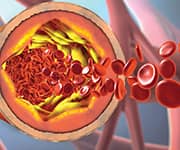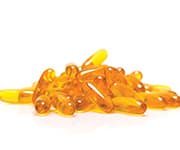Life Extension Magazine®
Coenzyme Q10 (CoQ10) is found in every cell in our body.
The highest amount is located in the mitochondria, the energy power houses of our cells.1
With age, mitochondrial function and CoQ10 synthesis decline, contributing to a range of degenerative conditions.2,3
Research has shown that supplemental CoQ10 improves mitochondrial function as well as organ performance. 1,4-8
As a defense against the assaults of aging, CoQ10 has been shown to suppress factors involved in nearly all chronic disorders. 1,6,7
Heart Function
CoQ10 is no newcomer to heart health.1,9,10
It has been prescribed in Japan to treat heart failure for decades. Research has shown it to be safe.11
One recent review paper presented preclinical and clinical evidence on the roles that CoQ10 plays in preventing and relieving heart disease, including:1
- Preventing the accumulation of oxidized LDL cholesterol in arteries,
- Decreasing stiffness of blood vessels, and
- Improving the function of the cells that line the inside of the blood vessels.
Clinical studies have shown that CoQ10 intake has clear benefits for the heart.
A clinical trial assessed the effects of CoQ10 supplementation against moderate-to-severe heart failure. Patients received either CoQ10 or placebo over a two-year period.
Those taking 100 mg of CoQ10 three times daily had a remarkable 43% reduction in major cardiovascular events like heart attack, stroke, or death, compared to the placebo group.10 Both groups were on standard drug therapy.
In another study, heart attack survivors were randomized to receive either CoQ10 or a low-potency vitamin placebo.
The group receiving 120 mg a day of CoQ10 for one year had reduced rates of total cardiac events by 45% and of nonfatal heart attacks by 46% compared to the placebo group.12
Statin drugs prescribed to lower LDL cholesterol further reduce coenzyme Q10 synthesis in the body. Those using a statin are often advised to supplement with CoQ10.13,14
Brain Aging
Mitochondrial dysfunction is believed to play a role in the development of brain-aging diseases like Parkinson’s and Alzheimer’s.15,16
Studies show that CoQ10 may help protect as follows:
- In patients with early Parkinson’s disease, taking daily CoQ10 at a dosage of 1,200 mg/day led to 44% less functional decline than taking a placebo.17
- A study of patients with Huntington’s disease, a progressive brain disorder, found that subjects given 300 mg of CoQ10 twice daily for one year tended to have less cognitive decline than a placebo group.18
- In a mouse model of Alzheimer’s disease, CoQ10 decreased the amount of beta-amyloid, a protein that accumulates in the brains of Alzheimer’s patients, and improved the animals’ cognitive and behavioral performance.19
Inflammation
Chronic inflammation is a driver of many different age-related chronic disorders.20
Meta-analyses of randomized controlled clinical trials have concluded that CoQ10 supplementation can significantly lower inflammatory markers.21,22
Another meta-analysis of randomized controlled trials reported CoQ10 supplementation significantly lowers markers of inflammation in individuals with metabolic syndrome. The authors described the ability of CoQ10 to inhibit oxidative stress, while also improving blood sugar control and liver function.23
What you need to know
CoQ10 Promotes Healthy Longevity
- Coenzyme Q10 (CoQ10) is essential for the production of energy by the mitochondria.
- CoQ10 deficiency has been found in many age-related diseases and processes, including brain aging and cardiovascular disease.
- One clinical trial showed that oral intake of CoQ10 slowed the age-related decline in vitality, physical performance, and health-related quality of life.
- CoQ10 intake can also help prevent cardiovascular disease by a variety of mechanisms.
- CoQ10 has been shown in one study to reduce the risk of major cardiovascular events including heart attack, stroke, and death in heart failure patients by 43%.
- CoQ10 may help protect against neurodegenerative diseases like Alzheimer’s and Parkinson’s diseases.
- CoQ10 has many other benefits, such as reducing skin wrinkles, and improving lung function.
Systemic Indicators of Reduced Aging
CoQ10 has demonstrated other benefits that include:
- Reducing wrinkles. A clinical trial showed that daily intake of CoQ10 (50 or 150 mg) significantly reduced skin wrinkles and improved skin smoothness compared with a placebo.4
- Enhancing physical performance. Men were assigned to take either CoQ10 (100 mg) or a placebo daily, then underwent fitness tests. Mean power was increased in those taking CoQ10 compared to a placebo.24
- Improving lung function. Patients with chronic obstructive pulmonary disease (COPD), a lung disease, who took 90 mg of CoQ10 daily for two months showed improvements in heart rate and a measure of how well oxygen moves from the lungs to the blood during exercise,8 along with improvements in hypoxemia (low blood oxygen) at rest.
- In asthma patients, oral CoQ10 resulted in improvement in air flow.25
Cellular Energy
Preclinical evidence has shown that CoQ10 is particularly promising for addressing a key aging factor: mitochondrial dysfunction.1,3,5,26-28
The mitochondria are responsible for energy production in our cells.29 Damage to these structures is a contributor to aging, playing a role in various age-related disorders and a shorter lifespan.3,5,27
Some of this damage is caused by oxidative stress. CoQ10 reduces oxidative stress in cells.1,26
Deficiency of CoQ10 is linked to increased oxidative stress and mitochondrial dysfunction,30 while oral CoQ10 intake has shown evidence of protecting against the progression of aging and development of age-related diseases.1,4,9,12,28
CoQ10 slows common symptoms of aging, including decreased vitality, physical performance, and quality of life.
In a clinical trial, elderly participants received either a placebo or a combination of CoQ10 and selenium. Participants took 200 mg of CoQ10 and 200 mcg of selenium each day. Over four years, those taking the CoQ10-selenium showed improved health-related quality of life and more days out of the hospital.9
Summary
The nutrient CoQ10 has shown promise in preventing and slowing degenerative disorders, including cardiovascular events and brain aging.
It functions via multiple mechanisms to enhance mitochondria energy output while combating chronic inflammation and oxidative stress.
Together, these effects may help slow certain aging processes and reduce symptoms of aging.
If you have any questions on the scientific content of this article, please call a Life Extension Wellness Specialist at 1-866-864-3027.
References
- Rabanal-Ruiz Y, Llanos-Gonzalez E, Alcain FJ. The Use of Coenzyme Q10 in Cardiovascular Diseases. Antioxidants (Basel). 2021 May 10;10(5).
- Barcelos IP, Haas RH. CoQ10 and Aging. Biology (Basel). 2019 May 11;8(2).
- Haas RH. Mitochondrial Dysfunction in Aging and Diseases of Aging. Biology (Basel). 2019 Jun 17;8(2).
- Zmitek K, Pogacnik T, Mervic L, et al. The effect of dietary intake of coenzyme Q10 on skin parameters and condition: Results of a randomised, placebo-controlled, double-blind study. Biofactors. 2017 Jan 2;43(1):132-40.
- Bratic A, Larsson NG. The role of mitochondria in aging. J Clin Invest. 2013 Mar;123(3):951-7.
- Dludla PV, Orlando P, Silvestri S, et al. Coenzyme Q10 Supplementation Improves Adipokine Levels and Alleviates Inflammation and Lipid Peroxidation in Conditions of Metabolic Syndrome: A Meta-Analysis of Randomized Controlled Trials. Int J Mol Sci. 2020 May 4;21(9).
- Fan L, Feng Y, Chen G-C, et al. Effects of coenzyme Q10 supplementation on inflammatory markers: A systematic review and meta-analysis of randomized controlled trials. Pharmacological Research. 2017 2017/05/01/;119:128-36.
- Fujimoto S, Kurihara N, Hirata K, et al. Effects of coenzyme Q10 administration on pulmonary function and exercise performance in patients with chronic lung diseases. Clin Investig. 1993;71(8 Suppl):S162-6.
- Johansson P, Dahlstrom O, Dahlstrom U, et al. Improved Health-Related Quality of Life, and More Days out of Hospital with Supplementation with Selenium and Coenzyme Q10 Combined. Results from a Double Blind, Placebo-Controlled Prospective Study. J Nutr Health Aging. 2015 Nov;19(9):870-7.
- Mortensen SA, Rosenfeldt F, Kumar A, et al. The effect of coenzyme Q10 on morbidity and mortality in chronic heart failure: results from Q-SYMBIO: a randomized double-blind trial. JACC Heart Fail. 2014 Dec;2(6):641-9.
- Hidaka T, Fujii K, Funahashi I, et al. Safety assessment of coenzyme Q10 (CoQ10). Biofactors. 2008;32(1-4):199-208.
- Singh RB, Neki NS, Kartikey K, et al. Effect of coenzyme Q10 on risk of atherosclerosis in patients with recent myocardial infarction. Mol Cell Biochem. 2003 Apr;246(1-2):75-82.
- Rundek T, Naini A, Sacco R, et al. Atorvastatin decreases the coenzyme Q10 level in the blood of patients at risk for cardiovascular disease and stroke. Arch Neurol. 2004 Jun;61(6):889-92.
- Deichmann R, Lavie C, Andrews S. Coenzyme q10 and statin-induced mitochondrial dysfunction. Ochsner J. 2010 Spring;10(1):16-21.
- Spindler M, Beal MF, Henchcliffe C. Coenzyme Q10 effects in neurodegenerative disease. Neuropsychiatr Dis Treat. 2009;5:597-610.
- Liu J, Wang LN, Zhan SY, et al. Coenzyme Q10 for Parkinson’s disease. Cochrane Database of Systematic Reviews. 2012 (5).
- Shults CW, Oakes D, Kieburtz K, et al. Effects of coenzyme Q10 in early Parkinson disease: evidence of slowing of the functional decline. Arch Neurol. 2002 Oct;59(10):1541-50.
- Group HS. A randomized, placebo-controlled trial of coenzyme Q10 and remacemide in Huntington’s disease. Neurology. 2001 Aug 14;57(3):397-404.
- Dumont M, Kipiani K, Yu F, et al. Coenzyme Q10 decreases amyloid pathology and improves behavior in a transgenic mouse model of Alzheimer’s disease. J Alzheimers Dis. 2011;27(1): 211-23.
- Chung HY, Kim DH, Lee EK, et al. Redefining Chronic Inflammation in Aging and Age-Related Diseases: Proposal of the Senoinflammation Concept. Aging Dis. 2019 Apr;10(2):367-82.
- Zhai J, Bo Y, Lu Y, et al. Effects of Coenzyme Q10 on Markers of Inflammation: A Systematic Review and Meta-Analysis. PLoS One. 2017;12(1):e0170172.
- Mantle D, Heaton RA, Hargreaves IP. Coenzyme Q10 and Immune Function: An Overview. Antioxidants (Basel). 2021 May 11;10(5).
- Dludla PV, Orlando P, Silvestri S, et al. Coenzyme Q(10) Supplementation Improves Adipokine Levels and Alleviates Inflammation and Lipid Peroxidation in Conditions of Metabolic Syndrome: A Meta-Analysis of Randomized Controlled Trials. Int J Mol Sci. 2020 May 4;21(9).
- Gokbel H, Gul I, Belviranl M, et al. The effects of coenzyme Q10 supplementation on performance during repeated bouts of supramaximal exercise in sedentary men. J Strength Cond Res. 2010 Jan;24(1):97-102.
- Comhair SA, Grandon D, Khan A, et al. Coenzyme Q in asthma. Am J Respir Crit Care Med. 2015 Jun 1;191(11):1336-8.
- Nakazawa H, Ikeda K, Shinozaki S, et al. Coenzyme Q10 protects against burn-induced mitochondrial dysfunction and impaired insulin signaling in mouse skeletal muscle. FEBS Open Bio. 2019 Feb;9(2):348-63.
- Salvioli S, Bonafe M, Capri M, et al. Mitochondria, aging and longevity--a new perspective. FEBS Lett. 2001 Mar 9;492(1-2): 9-13.
- Tian G, Sawashita J, Kubo H, et al. Ubiquinol-10 supplementation activates mitochondria functions to decelerate senescence in senescence-accelerated mice. Antioxid Redox Signal. 2014 Jun 1;20(16):2606-20.
- Available at: https://www.genome.gov/genetics-glossary/Mitochondria. Accessed October, 20, 2022.
- Zhong X, Yi X, da Silveira ESRC, et al. CoQ10 Deficiency May Indicate Mitochondrial Dysfunction in Cr(VI) Toxicity. Int J Mol Sci. 2017 Apr 24;18(4).
- Liguori I, Russo G, Curcio F, et al. Oxidative stress, aging, and diseases. Clin Interv Aging. 2018;13:757-72.









